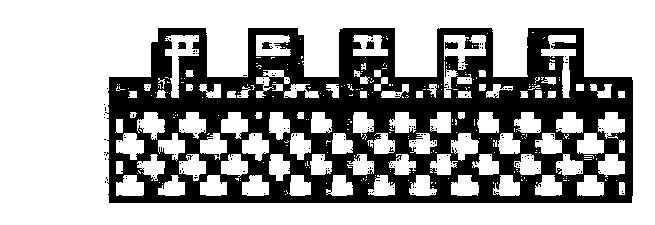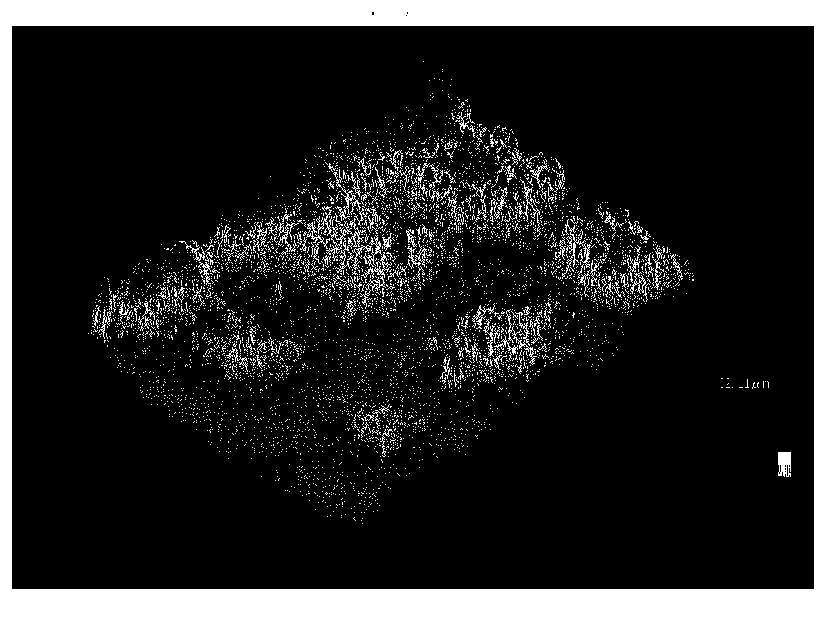Anode applied to direct hydroboron fuel battery and preparation method of anode
A technology of borohydride and fuel cells, which is applied to battery electrodes, circuits, electrical components, etc., can solve the problems of small surface area, few reactive sites, and constraints on DBFC performance, so as to improve battery performance, reduce H2 generation, and adapt to Effects on scale-up and mass production
- Summary
- Abstract
- Description
- Claims
- Application Information
AI Technical Summary
Problems solved by technology
Method used
Image
Examples
Embodiment 1
[0084] A. Preparation of porous diffusion layer
[0085] 1) Cut a piece of nickel foam with an area of 4(cm)×5(cm), a thickness of 0.20mm, and a porosity of 80% as the base material of the anode diffusion layer, and immerse it in acetone at room temperature for 10 minutes to remove oil Decontamination treatment, dry in an oven at 60°C until the weight of the carbon paper is constant, record the weight of the carbon paper, denoted as W 0 ;
[0086] 2) Weigh 160mg of Vulcan XC-72 carbon powder (manufactured by American Cabot Company), add 2.4g of ethylene glycol to it, ultrasonically and stir to disperse the slurry. Fluoride vinyl (PTFE) emulsion 0.2g, continue to ultrasonicate and stir until the slurry is uniform, and obtain a flat layer slurry a coated with a leveling layer;
[0087] 3) Using screen printing technology, evenly screen-print the slurry a obtained in 2) on the surface of nickel foam, and record the weight W of the diffusion layer by weighing method 1 , contr...
Embodiment 2
[0099] A. Preparation of porous diffusion layer
[0100] 1) Cut a piece of Toray TGP-H-060 carbon paper with an area of 4(cm)×5(cm) as the base material of the anode diffusion layer, immerse it in absolute ethanol at room temperature for 30min, and perform degreasing and decontamination treatment , dried in an oven at 80°C until the weight of the carbon paper is constant, and the weight of the carbon paper is recorded as W 0 ;
[0101] 2) Weigh 80 mg of high-conductivity carbon black, add 1.2 g of glycerol to it, ultrasonically stir and disperse the slurry. After the dispersion is uniform, add 20 (wt )% polytetrafluoroethylene (PTFE) emulsion 0.267g, continue to ultrasonicate and stir until the slurry is uniform, and obtain a flat layer slurry a coated with a leveling layer;
[0102] 3) Apply the slurry a obtained in 2) evenly on the surface of carbon paper by scraping method, and record the weight W of the diffusion layer by weighing method 1 , control the load of highly...
Embodiment 3
[0114] A. Preparation of porous diffusion layer
[0115] 1) Cut a piece of carbon cloth with an area of 4(cm)×5(cm), a thickness of 0.20mm, and a porosity of 78% as the base material of the anode diffusion layer, immerse it in isopropanol at room temperature for 20min, and carry out Degreasing and decontamination treatment, drying in an oven at 80°C until the weight of the carbon paper is constant, record the weight of the carbon paper, denoted as W 0;
[0116] 2) Weigh 40mg of graphite carbon with a particle size of 50~100nm, add 1.2g of absolute ethanol to it, ultrasonically stir and disperse the slurry, after the dispersion is uniform, according to the mass ratio of C:PTFE=4:6, Add 0.3 g of 20 (wt)% polytetrafluoroethylene (PTFE) emulsion dropwise, continue to sonicate and stir until the slurry is uniform, and obtain a flat layer slurry a coated with a leveling layer;
[0117] 3) Using screen printing technology, evenly screen-print the slurry obtained in 2) on the surf...
PUM
| Property | Measurement | Unit |
|---|---|---|
| Diameter | aaaaa | aaaaa |
| Thickness | aaaaa | aaaaa |
| Particle size | aaaaa | aaaaa |
Abstract
Description
Claims
Application Information
 Login to View More
Login to View More - R&D
- Intellectual Property
- Life Sciences
- Materials
- Tech Scout
- Unparalleled Data Quality
- Higher Quality Content
- 60% Fewer Hallucinations
Browse by: Latest US Patents, China's latest patents, Technical Efficacy Thesaurus, Application Domain, Technology Topic, Popular Technical Reports.
© 2025 PatSnap. All rights reserved.Legal|Privacy policy|Modern Slavery Act Transparency Statement|Sitemap|About US| Contact US: help@patsnap.com


